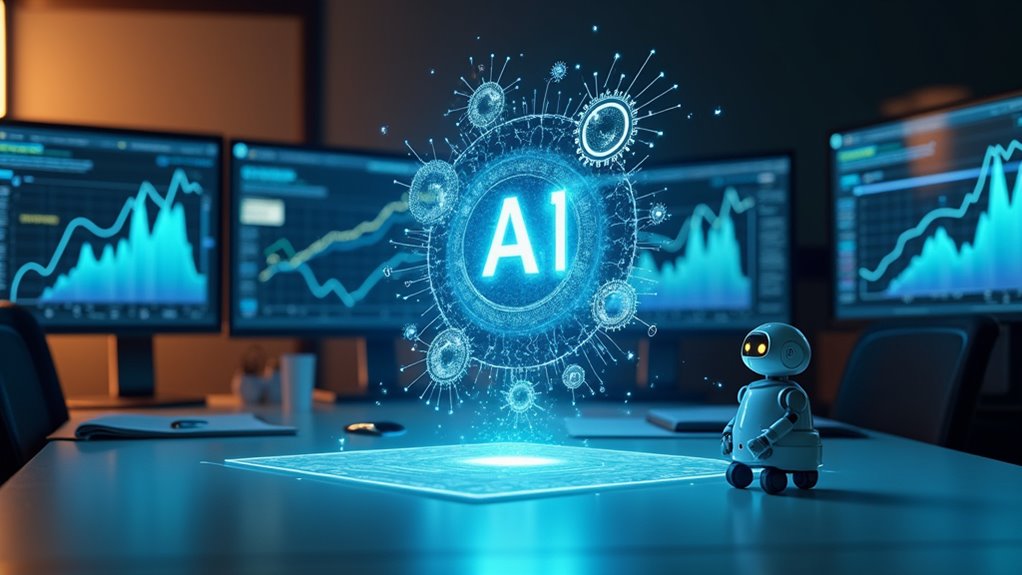Google’s AI journey began in 2001 with basic machine learning for spell-checking search queries. By 2006, they expanded AI capabilities with Google Translate, followed by applications across Maps and Images. The 2015 introduction of RankBrain marked a significant advancement in understanding user intent. Recent developments include the 2023 Search Generative Experience and 2024’s AI Overviews powered by Gemini. Google’s evolution from simple spell-correction to sophisticated reasoning systems shows their decades-long AI commitment. There’s much more to this technological transformation.

When exactly did the tech giant that dominates our digital lives start infusing artificial intelligence into its operations? Google’s AI journey began earlier than most people realize—all the way back in 2001. That’s when the company first incorporated machine learning to fix your embarrassing typos in search queries. Yes, that helpful feature that saves you from spelling “restaurent” wrong has AI roots spanning more than two decades.
This early AI milestone wasn’t just about spell-checking. By 2006, Google had already expanded its machine learning capabilities with the launch of Google Translate. Remember those hilariously bad early translations? That was AI learning on the job. Soon after, artificial intelligence spread throughout Google’s ecosystem, enhancing Maps, Images, and nearly every service you rely on daily.
Machine learning didn’t stay in the spelling lane—it quickly became the engine powering everything from translations to maps across Google’s digital universe.
Fast forward to 2015, and Google revealed RankBrain—an AI system that could actually understand what you meant, not just what you typed. Then came 2017’s Transformer architecture, laying groundwork for models like BERT that grasp context rather than treating words as isolated islands of meaning.
DeepMind’s AlphaFold solving the protein-folding problem in 2020 proved Google’s AI could tackle previously insurmountable scientific challenges. This breakthrough exemplified the human-centered design philosophy that ensures AI technologies amplify human capabilities rather than simply replace them.
The AI revolution accelerated dramatically in recent years. May 2023 saw Google testing its Search Generative Experience (SGE), followed by the official launch of AI Overviews in May 2024. These features use the custom-built Gemini model to create those helpful summaries that appear at the top of your search results. The system expertly retrieves relevant documents to generate comprehensive summaries that combine information from various sources. Recent data shows that these AI Overviews are so effective that they’ve increased user satisfaction while directing traffic to a more diverse range of websites.
Today, Google’s AI reduces complexity, understands context, learns from your behavior, and distributes traffic to diverse sources. The release of Gemini 2.0 models in late 2024 pushed capabilities even further.
What started as simple spell-checking has transformed into sophisticated systems that can reason through multi-step problems, plan solutions, and make sense of the digital chaos we face daily. Google’s two-decade AI evolution shows no signs of slowing down.
Frequently Asked Questions
How Has Google AI Affected Search Privacy?
Google’s AI-powered search algorithms have greatly impacted privacy through their voracious appetite for user data.
They collect extensive information to personalize results, creating detailed user profiles that raise serious privacy concerns. While this improves search relevance, it comes at a cost—your digital footprint is constantly tracked and analyzed.
Limited opt-out options exist, but let’s be real: Google’s AI systems affect billions worldwide, making their data collection practices a global privacy issue that’s hard to escape.
What Ethical Concerns Surround Google’s AI Implementations?
Google’s AI implementations face several ethical battlefronts.
Bias mitigation remains challenging despite company efforts, as algorithms sometimes perpetuate existing societal prejudices.
Transparency issues plague the company too—users rarely understand how AI makes decisions affecting their search results.
While Google touts its AI Principles as guardrails, critics question whether self-regulation is sufficient.
The company’s dual role as profit-driven entity and information gatekeeper creates inherent tensions between commercial interests and ethical responsibilities.
Can Users Opt Out of Google’s AI Features?
Google’s approach to AI opt-outs is frustratingly limited. Users can’t globally disable AI features like AI Overviews, despite privacy settings existing for other services.
Want control? Your options are slim: filter to “web-only” views for individual searches or install browser extensions as workarounds.
No exhaustive user control exists—just query-by-query management. While Google collects feedback to improve AI features, they’ve prioritized widespread implementation over giving users a simple “no thanks” button.
Is Google’s AI Development Behind Competitors Like Openai?
In AI comparisons between tech giants, Google isn’t necessarily behind—just different.
While OpenAI grabbed headlines with ChatGPT, Google brings decades of AI infrastructure and vast data resources to the competition. Their competitor analysis approach emphasizes integrating AI across services rather than standalone products.
Google’s DeepMind reorganization and Gemini’s release demonstrate aggressive catch-up efforts. The real difference? OpenAI’s flashy consumer-facing releases versus Google’s more methodical, service-integrated AI deployment strategy.
Both approaches have merits, depending on the measurement criteria.
How Much Does Google Invest in AI Research Annually?
Google doesn’t publicly disclose specific AI funding figures, but their research allocation is substantial.
They’ve acquired 11 AI startups between 2012-2017 and established Gradient Ventures, investing $1-8 million in AI startups annually. Their investment strategy prioritizes talent acquisition over profitable businesses.
While venture capital AI investments tripled from $3.2 billion to $9.5 billion (2014-2017), Google maintains leadership through diverse funding approaches including grants, equity investments, and product credits for startups using Google services.









